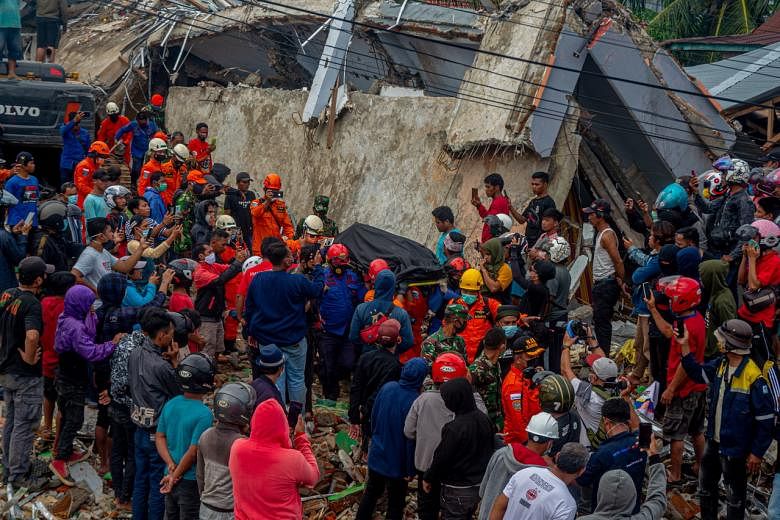JAKARTA (REUTERS, AFP) - At least 73 people have been killed after an earthquake struck Indonesia's West Sulawesi province on Friday, the disaster mitigation agency (BNPB) said on Sunday (Jan 17), the latest in a string of disasters to hit the Southeast Asian country.
More than 820 people were injured and over 27,800 left their homes after the 6.2 magnitude quake, BNPB spokesman Raditya Jati said. Some sought refuge in the mountains, while others went to cramped evacuation centres, witnesses said.
Police and military officers have been deployed to crack down on looting in several parts of the region, Mr Jati said. An emergency response status, intended to help rescue efforts, has also been put in place for two weeks, he added.
The authorities have not given a figure for how many survivors have been rescued, and the death toll from the quake could still rise.
Ms Dwikorita Karnawati, the head of Indonesia's meteorological, climatology and geophysical agency (BMKG), has said that another quake in the region could potentially trigger a tsunami.
Straddling the so-called Pacific Ring of Fire, Indonesia is regularly hit by earthquakes. In 2018, a devastating 6.2-magnitude quake and subsequent tsunami struck the city of Palu, in Sulawesi, killing thousands.
Just two weeks into the new year, the world's fourth-most populous country is battling several disasters.
Floods in North Sulawesi and South Kalimantan province each have killed at least five this month, while landslides in West Java province have killed at least 29, authorities said.
On Jan 9, a Sriwijaya Air jet crashed into the Java Sea with 62 onboard.
East Java's Semeru mountain erupted late on Saturday, but there have been no reports of casualties or evacuations.
Ms Dwikorita said extreme weather and other "multi-dangers" of hydrometeorology are forecast in the coming weeks.
Rescue work ongoing
Since last Friday, rescuers have been hauling bodies from beneath crumpled buildings in Mamuju, a city of 110,000 people in West Sulawesi province, where a hospital was flattened and a shopping mall lay in ruins. Others were killed south of the city.
Aerial images from the devastated seaside city showed buildings reduced to a tangled mass of twisted metal and chunks of concrete, including the regional governor's office.
It was unclear how many more bodies could be under the debris, or if there was anyone still trapped but alive more than two days after the disaster.
A pair of young sisters plucked from under the mass of concrete and other debris were treated in hospital.
Meanwhile, bodies were recovered from under a collapsed hospital, while five members of a family of eight were found dead in the crumpled remains of their home.
Running low on food, supplies
The thousands left homeless by the quake took to makeshift shelters - many little more than tarpaulin-covered tents filled with whole families - that were lashed by heavy monsoon downpours.
They said they were running low on food, blankets and other aid, as emergency supplies were rushed to the hard-hit region.
Many survivors are unable to return to their destroyed homes, or were too scared to go back fearing a tsunami sparked by aftershocks, which are common after strong earthquakes.
"It's better to take shelter before something worse happens," said Mamuju resident Abdul Wahab, who took refuge in a tent with his wife and four kids, including a baby.
"We hope the government can deliver aid soon like food, medicine and milk for the children," he added.
Worried about an outbreak of Covid-19 in the crowded camps, authorities said they are trying to separate high- and lower-risk groups.
The quake's epicentre was 36km south of Mamuju and it had a relatively shallow depth of 18km.

